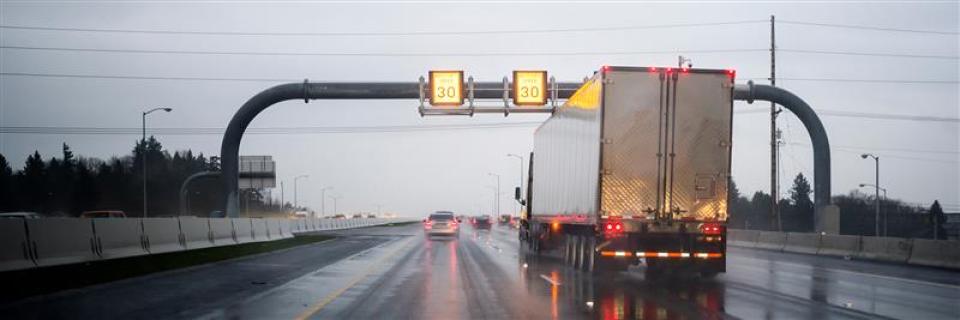
For over-the-road truckers, being caught unprepared during hurricane season (June to November) is a major threat to your rig, your cargo and your safety.
You're probably wondering, "What are my duties as a trucker when a storm hits? Does my auto insurance cover hurricane damage? How do I prepare my truck before a storm?"
And, perhaps most importantly, "When it's all over, what steps do I take next?"
Let's break down what truck drivers should do before and after a hurricane or tropical storm hits.
How to Prepare for a Hurricane as a Trucker
Preparation is your best defense. Whether you’re parked or on the move, here are some ways to get ready:
- Plan your routes. Avoid hurricane-prone areas when possible and monitor NOAA alerts, DOT updates and other weather tracking tools.
- Secure your equipment. High winds can flip trailers or damage exposed gear. If you park your truck, avoid low-lying areas prone to flooding. Use wheel chocks and consider adding heavy ballast in trailers if empty.
- Keep emergency supplies in your cab. Non-perishable food, bottled water, flashlights, extra phone chargers, a weather radio and basic tools can make a huge difference.
- Fuel up early. Gas shortages are common before storms. Keeping a full tank can mean the difference between getting out safely or getting stuck.
- Communicate with dispatch. Let your team know your location and establish a plan for check-ins.
After the Storm: Getting Back on the Road
When the hurricane has passed, trucking operations shift from survival mode to recovery. And sometimes trucking means going where others can’t.
Re-entering Hurricane-Impacted Areas
- Reassess your route for days, not hours. Recovery takes time — some roads may reopen quickly while others remain closed for weeks.
- Plan fuel and service stops ahead. Power outages can shut down gas stations, repair shops and rest areas.
- Watch for secondary hazards. Even after floodwaters recede, roads may be slick with mud or weakened underneath. Also, watch for compromised infrastructure, such as unstable bridges.
- Be prepared for high demand. Relief shipments, construction materials and displaced freight can create unusual traffic and delivery schedules.
- Check your equipment at the end of each shift. Post-storm driving can be hard on brakes, tires and suspension. Address small issues before they become big problems.
Hauling Emergency Supplies?
If you're part of the relief effort, special considerations may apply.
- Carry proof of purpose if you're hauling emergency goods or relief aid. States will likely have checkpoints or limited access zones.
- Emergency Hours of Service (HOS) exemptions may be issued to help speed up aid.
- FEMA contracts and special protocols could allow access to otherwise restricted areas.
Hurricane Damage to Your Truck
If you encounter storm-related damage to your truck or trailer, document it immediately and contact your insurance provider. The right commercial auto policy can make the difference between a quick recovery and extended downtime. Many companies, including RTS, offer customizable insurance policies tailored to OTR drivers so they can protect their truck, trailer, cargo and livelihood.
RTS: Fuel, Factoring & Freight to Weather the Storm
Hurricanes don’t wait. As a trucker, neither should you. RTS is a leading provider of fuel and maintenance savings programs for truckers across the United States, so they can keep the country moving when roads get tough. We also offer factoring services, putting cash in your pocket from outstanding invoices when you need it most.